| |
|
Keeper
of The Dream
[FEB. 10, 2000] In
commemoration of African American History month, Keeper of
The Dream Jim Lucas, a nationally recognized orator,
brought his one-man show, "Reflections," to
Lincoln College earlier this week. His presentation
included dramatic recitations and interpretive readings
portraying the life and times of the Reverend Dr. Martin
Luther King Jr.
|
|
Jim
Lucas, a Louisiana native, walked through the crowd of
white, black, Hispanic and Asian students toward the table
top podium in the Meyer-Evans Student Center, and gave a
captivating portrayal of the life and times of the Rev.
Dr. Martin Luther King Jr. He began with the lyrics to
King’s favorite song; "If I could help somebody…
then my living would not be in vain."
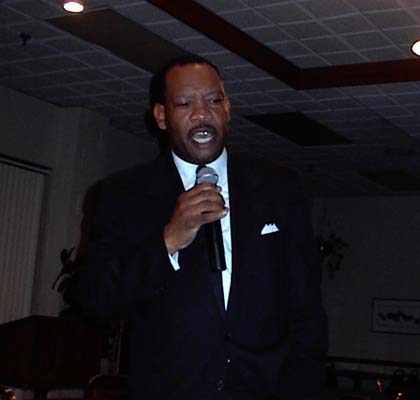
He
spoke about the life of King and explained how Rosa Parks’
refusal to give up her seat on the bus to a white man
changed history. Jim Lucas shared King’s thoughts on how
the Southern Christian Leadership Conference grew out of
the Montgomery bus boycott and how it eventually lead to
the Poor Peoples Campaign of 1968, once King understood
that it was the class system and not race that was the
problem. King realized that poor whites weren’t treated
any better than poor blacks. Jim Lucas then recited
excerpts from King’s "I Have a Dream" speech.
In
addition he talked about the many obstacles that African
Americans had to overcome in order to register to vote and
how college students today have the worst voting record of
any group. Lucas asked the students to vote and
participate in the political process so that they can have
a voice. He then administered a test that was often given
to African Americans in the south when they tried to
register to vote. He asked for a volunteer to recite the
U.S. Constitution verbatim but the room fell silent with
no takers.
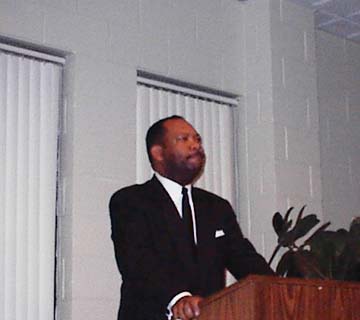
|
Lucas
shared a story about when his father went to register to
vote in Louisiana. His father was a farmer with an
off-season job as a salesman in a clothing store. His
father, being aware that there would be consequences to
his decision to register to vote, put on his Sunday suit
and told his employer that he was going to register to
vote on his lunch hour. His father asked his employer if
he should bother to come back to work after his lunch
hour. The employer told him to take his time, get
registered and to come back to work.
He
spoke about King’s one-on-one spiritual experience after
he had received a call threatening his life and the lives
of his wife and first child. King prayed in his kitchen
over a cup of coffee until he heard a voice say, "I
will be with you until the ends of the earth." King
said that from that moment on he was never afraid.
"I
decided to bring Dr. King to life after listening to an
audiotape of one of his speeches at a conference,"
Lucas said. "It was then that I decided that his
words should come to life. Dr. King was a hero of mine and
I chose to emulate and portray him. His legacy is current
history and not ancient history."
[Kym
C. Ammons-Scott]
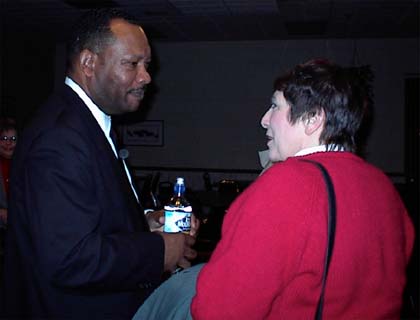
|
|
Perceived
Problems Shown in Capstone Survey
Drugs,
alcohol and domestic abuse stand out for community
that generally likes itself
[FEB.
9, 2000]
The
good news in the Capstone committee’s survey ["Lincoln
Loves Library,
9-1-1, Fire Service"] is that Lincoln residents
are generally very favorable toward their community. Most
public services received a high rating. Dr. Ernest Cowles,
from the University of Illinois at Springfield’s Center
for Legal Studies, worked with Lincoln’s mayor and
police department to prepare and conduct the survey.
Cowles told a group of citizens assembled at Lincoln
Community High School last night that, "In most
communities we find much higher levels of dissatisfaction
with public services."
|
|
Indeed,
the majority of the residents surveyed were satisfied with
everything from their public library to the fire
department, police department, schools, and park and
recreation services. The respondents were particularly
pleased with the Lincoln Police Department’s community
policing activities, including its school-based programs,
neighborhood patrols, and workshops.
Dana
Wilmert, a Lincoln native and now a researcher at the
Center for Legal Studies, assembled the report of the
survey data for Lincoln. Analysis by neighborhood (four
quadrants of the city) revealed that, "not many
problems were significantly related to the
neighborhood," said Ms. Wilmert. The perceptions cut
pretty consistently across neighborhoods. When examined by
age group, the 68 and over group (which constituted about
one quarter of the respondents) was more sanguine about
city services than other groups, but more pessimistic
about crime.
When
the survey probed residents about crime, their concerns
centered primarily on three areas: drug abuse, alcohol
abuse and domestic violence. It should be noted that a
survey reveals only people’s perceptions. The Lincoln
Daily News intends to contribute to a discovery and
analysis of the reality of both the positive
characteristics of Logan County and the problem areas. In
today’s How
We Stack Up column in the Commentary section, LDN
compares drug arrests in Logan County with those in nine
other Illinois counties of similar size.

|
In
1998, county and city police in Logan County recorded 200
arrests for drug-related crimes. Of the 10 counties
compared, Logan County ranked fourth in number of
drug-related arrests per 1,000 of county population. A
higher number of arrests might indicate an unusually high
level of drug activity or an especially productive police
force. A lower number might indicate a low level of drug
activity or a lax police force.
The
Lincoln Daily News will present comparative data on
other factors in How We Stack Up over the coming weeks.
LDN hopes this information will be helpful to community
groups that study community issues.
According
to Cowles, people’s perceptions of problems are
sometimes related to their awareness of an issue. "As
you raise people’s awareness of a problem they tend to
see it as a serious problem." Local media and
discussion-group attention to a problem may elevate
residents’ perception of the seriousness of the problem.
On
the other hand, every community can bear improvement. LDN
will provide information about problems and perceived
problems so steps toward improvement can be taken on firm
ground.
Yesterday
the Lincoln Daily News announced the creation of
its Ombudsman
section. This is another effort by LDN to help a good
county become even better. LDN encourages its readers to
submit specific problems that should be addressed.
|
|
Lincoln
Loves Library,
9-1-1, Fire Service
Capstone
survey shows Lincoln residents like their town
[FEB.
8, 2000]
A
year ago, with a grant from the State of Illinois, the
Lincoln Police Department organized Capstone, a community
policing project that began with an assessment of the
community’s strengths and areas of concern. A
sixty-member advisory group met with consultants from the
Regional Institute of Community Policing, to discuss
issues related to quality of life, safety, crime, and
satisfaction with city services.
|
|
The Capstone committee developed a community survey,
and on September 25, forty Lincoln Community High School
students took the survey door to door to households
selected by a computer to represent every neighborhood.
"The survey was designed to give us insights into
things we are doing well and things we need to
improve," said Officer Rich Montcalm, Lincoln Police
Department’s coordinator of community policing.
The average age of respondents was 54 years, with ages
ranging from 22 to 92. Respondents had lived in Lincoln
from 2 months to 84 years, with the average being 29
years. Slightly more females (56%) than males (44%)
completed the surveys. Seventy-five percent of respondents
were homeowners, and 23% were renters.
What do Lincoln residents like most? Ninety-seven
percent were satisfied with their 9-1-1 service, and 95%
were satisfied with their library and fire service.
Garbage collection achieved 94% satisfaction, followed
closely by the utilities—electricity and natural
gas/heating at 92% each.

Streets, sidewalks, animal control and sewers cited as
problem areas
At the other end of the scale, there was less
satisfaction with sewers/storm drains (59%), animal
control services (56%), sidewalk maintenance (50%), and
street maintenance (48%). Only street maintenance had
fewer respondents dissatisfied than satisfied. Comments
indicated that perceived problems with street maintenance
included the timing and inconvenience of repairs.
Community policing popular with Lincoln residents
The Capstone survey, with its genesis in the community
policing program, covered police-related issues in
particular detail. Lincoln residents like their police
department’s bike patrols, foot patrols, residential
patrols and targeted patrols. They want more school
programs (DARE, violence prevention) and community
policing activities (block parties, workshops,
neighborhood watch, ride alongs, citizen police academy).
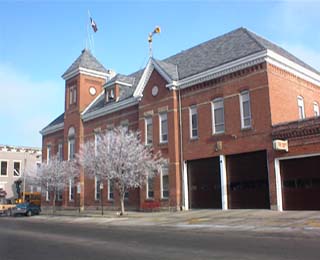
Lincoln residents encourage their police department to
continue drug busts and alcohol stings, including
targeting stores and individuals that sell to minors. In
fact, substance abuse related crimes were the number one
crime problem cited by respondents in the survey. Other
problem areas were property damage/theft/vandalism,
domestic violence and child abuse, youth crimes, and
shoplifting.
The Lincoln citizens surveyed, while strongly
supportive of the Police Department’s programs, indicate
in a few comments that they would like to see officers
required to meet annual physical fitness tests. Comments
also reveal that some citizens perceive abuse of authority
(harassment, entrapment, covering up for fellow officers)
as an area of concern, as well as misuse of patrols
(talking with other officers while on duty, too many squad
cars responding to a call.)
Satisfaction with public services
The complete list of city services surveyed and the
percentage of respondents who were satisfied with each
service follows.
| Percent of Respondents Satisfied with Public Service |
| Service
Satisfaction |
| 9-1-1 service |
97% |
|
Library service
|
95% |
|
Fire service
|
95% |
|
Garbage collection
|
94% |
|
Electricity
|
92% |
|
Natural gas/heating
|
92% |
|
Street lights
|
88% |
|
Public health through inspections
|
87% |
|
Public parks & recreation
|
84% |
|
Police service
|
84% |
|
Education services through schools
|
84% |
|
Traffic lights/street signs
|
82% |
|
Cultural arts activities and events
|
82% |
|
Telephone services
|
79% |
|
Housing services
|
75% |
|
Water services
|
74% |
|
Recycling services
|
72% |
|
Zoning/building codes
|
67% |
|
Sewers/storm drains
|
59% |
|
Animal control services
|
56% |
|
Sidewalk maintenance
|
50% |
| Street maintenance |
48% |
|

Acceptability of conditions in city
In addition to querying respondents about the public
services they receive, the survey asked about the level of
acceptability of a variety of conditions in the city. For
example, 88% of respondents found the degree to which
streets are lined with trees or shrubs to be at an
acceptable level. Other conditions were rated as follows.
| Conditions in Lincoln at Acceptable Level |
|
Condition
Acceptable Level
(% of Respondents who Agree
Condition is at Acceptable
Level) |
|
Degree to which streets are lined
with trees or shrubs
|
88% |
|
Noise level
|
85% |
|
Traffic congestion
|
83% |
|
Number of public parks and
recreation facilities
|
80% |
|
Amount of trash present
|
79% |
|
Number of homeless people
|
79% |
|
Number of street and traffic signs
|
78% |
|
Cleanliness of streets, sidewalks, yards
|
77% |
|
Level of insect/rodent infestation
|
75% |
|
Number of abandoned or broken
down vehicles
|
75% |
|
Number of vacant lots
|
75% |
| Number of safe places for kids to play |
73% |
Crimes in the city
The survey asked if the following crimes were
"under control" in the community. The following
percentages answered "yes."
| Percent of Respondents Who Believe Crime is Under
Control in Lincoln |
| Crime
Under Control |
|
Sale of illegal weapons
|
96% |
|
Soliciting sex for money
|
93% |
|
Illegal discharge of guns
|
93% |
|
Robbery with use/threat
of force or violence
|
79% |
|
Stalking
|
79% |
|
Stolen cars
|
74% |
|
Threat or intimidation based on
religion, race, ethnicity, or sexual preference
|
73% |
|
Attempted or committed rape
|
71% |
|
Arson
|
71% |
|
Public intoxication
|
70% |
|
People harassed by groups of youths
|
69% |
The survey yielded many comments and other data that
will be presented at a public forum at Lincoln Community
High School at 6:30 Tuesday evening, Feb. 8.
|
|
For
Youth and For America
Japanese
woman visits local 4-H club
[FEB.
9, 2000] They
are learning about how to make the best better.
That’s the 4-H motto.
Just this week, members of the Millennium Clovers,
a recently reorganized 4-H club, discovered that this
means reaching out, discovering new things and embracing
new ideas.
|
|
As
all 15 members gathered around the board room table,
President Chris Ackerman brought the meeting to order.
Roll call was taken and every member recited the
pledge. Secretary Brook Wibben read the minutes, Zach
Goodman gave the treasurer’s report, and old business and
new business matters were raised.
The meeting was under way.
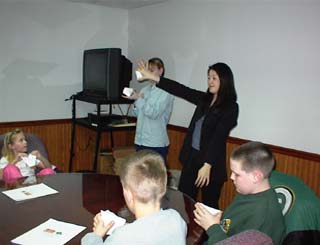
Minutes
later, these pre-teens were transported to another place,
all the way across the globe.
It is a place so rich in tradition that it could only
come to life through the eyes of one of its own.
Chie
Murakami, a native of Sendai, Japan, a city located just north
of Tokyo, spoke to these 4-H’ers about life in her
country. A
sophomore at Lincoln College, Murakami came to the United
States as a senior in high school to live with a host family
in Rockford, Ill. She
is the first person in her family to come to the United
States.
“My
parents were not excited in the beginning,” she confesses.
“Now they are very proud of me.”
Murakami enjoys giving presentations to youngsters
because she believes it will help her become a better
teacher.
Since
seventh grade, she has been learning the English language,
and while she spoke English when she came to America, she
admits, “You would have to ask my host family how good.”
In order to make sure she conveys her ideas
accurately and in case she has questions about American
slang, Murakami brings her roommate, Lacey Middlecoff of
Alton, along with her.
“She is my walking dictionary,” Murakami adds.
The
4-H’ers questioned Murakami about life in Japan. They were eager to know what type of commercialism is present
in her country. She
reassured them that Japanese students are very familiar with
Nike and Pepsi.
|

In
addition, the 4-H’ers learned that school in Japan is all
year round—from April through March, with three vacations
spread throughout the year.
As
early as kindergarten, Japanese children learn the
traditional art of origami.
Murakami walked the 4-H’ers through an origami
demonstration. In
the end, each boy and girl had a usable cup made completely
out of paper.
Another
Japanese tradition is the coming of age ceremony, at age 20.
Murakami says this is when a Japanese teen becomes an adult.
“You can drink, smoke, vote, just be
independent.” For
the ceremony, Murakami donned a multi-colored kimono made
entirely of silk. “This
is a very big tradition,” she says.
Murakami
also introduced the 4-H’ers to her native language. Her
first name Chie, which is derived from her mother’s name,
means “wise.” She also wrote out each member’s name using traditional
Japanese characters, and she brought several Japanese
“teen” magazines, which included the latest Japanese
styles and trends. Finally,
she even taught them how to pronounce certain Japanese words
including, hello (kon-ni-chi-wa), goodbye (si-you-nar-a) and
thank you (ari-gato).
Editor’s
Note: Murikami,
who discovered Lincoln College through the Peterson’s
Guide to Two-Year Colleges, will graduate with her A.A. in
May. She
aspires to be a Japanese Education teacher and will continue
her education at the University of Wisconsin next fall.
[Natalie
Jeckel]
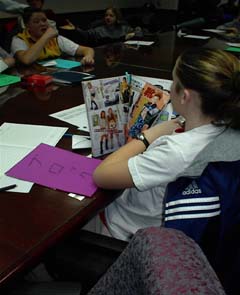
|
|
Washington-Monroe Jumps for
Heart Health
[FEB.
5, 2000] Teachers,
parents, students and alums at Washington-Monroe
Elementary School pitched in to raise more than $1,000 for
the American Heart Association Saturday. “This is the
third year for the event,” said sixth-grade teacher
Debbie Pettit, “and we have already exceeded our goal.”
|
|
Former Washington-Monroe student and current Railer
basketball standout, Gregg Alexander, twirled a rope while
W-M students jumped. Thirty-eight students collected
pledges for the Heart Association, and twenty-seven
students jumped for an hour and a half Saturday
morning.
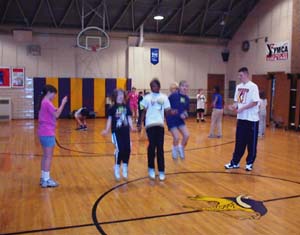
[Gregg
Alexander twirls for W-M jumpers.]
Washington-Monroe principal, Rebecca Cecil, and event
coordinators Leslie Singleton and Mrs. Pettit credited a
parents’ committee for the organizational work that made
the event a success. Amy Gordan, Joni Hundreiser and Bev
Wonderlin kept track of each student’s contribution to the
project.
|
Mrs. Singleton asked that contributions for the American
Heart Association be sent to her or Mrs. Pettit at
Washington-Monroe Elementary School, 1002 Pekin Street, in
Lincoln. Checks should be made to the American Heart
Association.
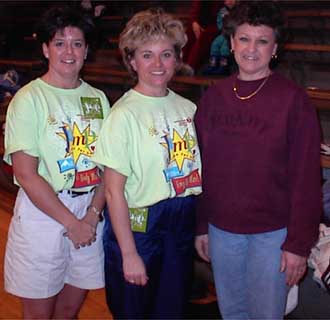
[Teachers
Leslie Singleton and Debbie Pettit and principal Rebecca
Cecil wait their turn to jump.]
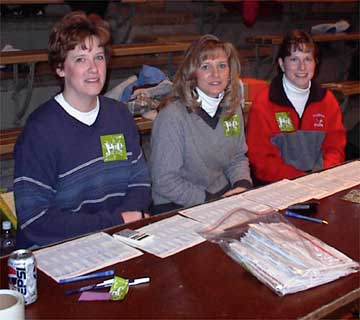
[Parents
Amy Gordan, Joni Hundreiser and Bev Wonderlin help
organize the event.]
|
|
|
|
|



